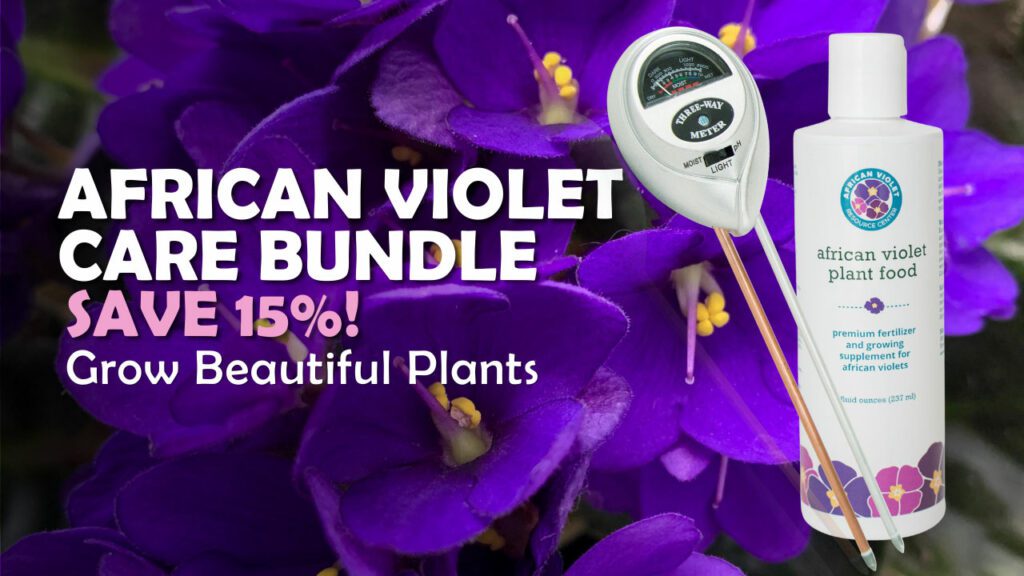FAQ #1: Why Should I Use African Violet Food?
Like all plants, African violets power their essential processes by drawing nutrients from the soil around them. In the wild, natural cycles replenish these nutrients as they’re depleted. Unfortunately, in your living room, that’s not the case. Over time, a potted plant will use up all the nutrients from the soil in which it’s planted. And that’s bad news for hungry houseplants.
Enter African violet plant food!
Regularly fertilizing your plant replenishes the nutrients your plant needs to grow healthy and strong. Three essential nutrients (nitrogen, potassium, and phosphorus) and several secondary nutrients help power healthy foliage, vibrant blooms, and strong root systems. Simply put: your plant needs them to survive.
FAQ #2: What Should I Feed My African Violets?
There are numerous ways to fertilize your African violet. From pellets to liquids to powders; fast-acting to slow-release; and a variety of nutrient compositions—it can get overwhelming! Don’t sweat it, just take a deep breath and look for the following:
Urea-Free Product
Many fertilizers, particularly budget options, derive nitrogen from an organic compound called urea. While cheap and effective, urea can be harmful to delicate plants like the African violet. We recommend choosing a urea-free African violet food to prevent root burn and other problematic side effects.
100% Water-Soluble
Your plant absorbs fertilizer by absorbing nutrient-infused water through its roots. That’s why you want to make sure your African violet food is 100% water-soluble. Otherwise, your plant won’t be able to synthesize the entire mix and will miss out on a well-rounded meal.
African Violet-Specific
We always recommend selecting a fertilizer that is specifically formulated for your plant. That’s because different species of plants evolved from different environments function best with different levels of certain nutrients. An African violet-specific plant food will ensure your fuzzy friend gets exactly what it needs for dinner.
Want to skip the guesswork? Our gentle, liquid blend is formulated with your plant in mind and safe to use every time you water!
Buy African violet plant food online.
FAQ #3: How Do I Use African Violet Plant Food?
Whatever method you select, don’t forget Rule #1 of African violet plant food: follow the directions! Every type of fertilizer and individual product will have specific usage requirements. The most important thing you can do is to take the time to read the instructions on the package before applying.
FAQ #4: What Are the Symptoms of an Overfertilized plant?
Uh oh! Been a little too generous with your plant food? Don’t worry, there’s a good chance your plant will recover. But first, here’s what to look for:
- Orange crystals: Check for a buildup of orange sediment on the hairs that cover your plant’s leaves. The crystals will be particularly visible around the crown.
- Browning tips: Overfertilization can cause necrosis, or root tip burn, which is the darkening of the leaves at the tip.
- Lesions: Leaves and steams weakened by nutrient overload will split where they rest on the rim of the pot.
How to treat African violet overfertilization
- Leach your plant’s soil thoroughly with room-temperature water.
- Gently rinse the plant and pot with lukewarm water, taking care to remove any visible sediment buildup.
- Gently remove any orange sediment from the leaves with a soft, damp washcloth.
- Wait around one week and resume regular feeding with a gentle, urea-free plant food.
- Leach the soil every 90 days.
FAQ #5: What Are the Symptoms of an Under-Fertilized African Violet?
An under-fertilized African violet is starved of the nutrients it needs to function, causing it to weaken and struggle to grow. Here are the signs your plant needs a good meal:
- Stunted growth: A lack of nutrients can cause plant growth to slow or stop completely and impede new blooms.
- Yellow leaves: Nitrogen helps your plant grow lush green leaves; a deficiency can cause them to yellow or turn a muted green.
- Weak & wilty: Potassium strengthens and fortifies your plant; under-nourished leaves and stems become droopy and limp.
Here’s how to treat an under-fertilized African violet:
- First, give your plant a good drink (never fertilize dry soil, it’s too harsh!).
- Don’t overcompensate with extra food! Stick to the recommended dosage and pick up your regular routine.
- Use African violet-specific plant food to ensure your plant gets exactly the fix it needs.
- Avoid future mishaps by using a gentle, urea-free African violet fertilizer that you can add every time you water.
Do you have another pressing question about African violet food? Let us know in the comments below!
Join the African Violet Club!
Whether you’re just starting out or are a seasoned grower, African Violet Resource Center has everything you need to help your plant grow vibrant and strong. Explore our other articles, visit our online shop, and connect with other houseplant lovers in our Facebook group to learn everything you need to know about this rewarding hobby!
More Great African Violet Resources
5 Growing Tips to Consider Before You Buy an African Violet Plant
8 Tricks to Get Your African Violet to Bloom Again
6 Signs Your African Violet Is Dying and How to Revive It
Endless Summer: Here’s How to Grow an African Violet Garden That BLOOMS





